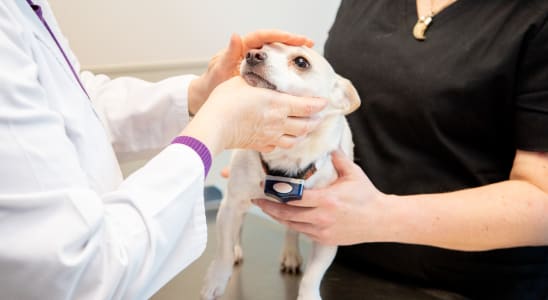At Thomasville Veterinary Hospital Urgent Care + Surgery, we provide comprehensive preventive services to keep your pet feeling their best. From pet vaccinations to parasite prevention, your pet's needs are our priority.
Vaccinations & Parasite Prevention
Preventive health care, including routine checkups, vaccinations, and parasite prevention, is key to lifelong health for cats and dogs of all ages. By providing age-appropriate cat and dog vaccinations and parasite prevention, we can give your pet a great start, prevent disease and help them live a long, healthy life.
We'll work with you to create a custom plan to meet your cat's or dog's specific health and lifestyle needs.

Vaccination Schedules For Cats & Dogs
Prevent your pet from contracting contagious diseases by bringing them in for extremely important routine vaccinations.
We follow the AAHA’s guidelines for immunizations, and are highly knowledgeable about how to protect them against emerging diseases.
Kitten Vaccinations
During their first year, kittens require several vaccinations and procedures to prevent serious diseases. As they grow, they'll need annual boosters.
- 6 to 8 weeks
- Rhinotracheitis, Calcivirus, Panleukopenia, Chlamydia
- 10 to 12 weeks
- Booster: Rhinotracheitis, Calcivirus, Panleukopenia, Chlamydia
- Feline Leukemia
- 14 to 16 Weeks
- Booster: Rhinotracheitis, Calcivirus, Panleukopenia, Chlamydia
- Feline Leukemia 2
- Rabies
- 5 to 6 months
Spaying, neutering and microchipping your cat can protect them from several health problems and prevent unwanted pregnancies.
- Spay (females)
- Neuter (males)
- Possible microchip
Puppy Vaccinations
Puppies need a set of vaccinations in the first year of life to prevent many fatal diseases and to protect their developing immune system.
- 6 to 8 weeks
- DHPP (Distemper, Hepatitis, Parainfluenza, Parvovirus)
- Bordetella (Optional)
- 10 to 12 Weeks
- Booster: DHPP (Distemper, Hepatitis, Parainfluenza, Parvovirus)
- Leptospirosis (Optional)
- 14 to 16 Weeks
- Booster: DHPP (Distemper, Hepatitis, Parainfluenza, Parvovirus)
- Rabies
- Booster: Bordetella (Optional)
- Booster: Leptospirosis (Optional)
- 5 to 6 months
Spaying, neutering and microchipping your cat can protect them from several health problems and prevent unwanted pregnancies.
- Spay (females)
- Neuter (males)
- Possible microchip
- 12 to 16 Months
- Booster: DHPP (Distemper, Hepatitis, Parainfluenza, Parvovirus)
- Rabies
- Booster: Bordetella (Optional)
- Booster: Leptospirosis (Optional)
Adult Cat Vaccinations
One year after they receive vaccinations as a kitten, your cat will need core booster vaccines. Frequency of vaccine boosters will depend on your cat's lifestyle & specific vaccine requirements.
Adult Dog Vaccinations
One year after receiving their initial round of vaccines, your dog will need core booster vaccines. Frequency of boosters will depend on your dog's lifestyle, unique needs, and specific vaccine requirements.
Parasite Prevention
Left untreated, parasites are a serious, ever-present threat to your pet's life. At Thomasville Veterinary Hospital Urgent Care + Surgery, our professional veterinarians take care to prevent these. Our full line of prevention products safeguard your pet from these common parasites:
Fleas
These common, small external parasites suck blood, and can transmit other parasites.
Ticks
Ticks are external parasites that feed on an animal's blood, and can transmit disease.
Ear Mites
Ear mites can cause intense itching and lead to infection in the ear canals of your cat or dog.
Heartworm
Mosquitoes commonly transmit these parasitic roundworms to cats, dogs, and other mammals.
Hookworm
Hookworms are intestinal parasites that infect the digestive system of dogs and cats and feed on blood.
Roundworm
Roundworms reside in the intestinal tract, feed on partially digested food, and cause serious issues.
Tapeworm
Parasitic tapeworm eggs are transmitted when an animal swallows an infected flea.
Whipworm
The parasitic whipworm resembles a whip and embeds itself in an animal's intestinal wall.
Microchipping
Dog and cat collars with a name and phone number tag are helpful, but can quickly become outdated and therefore, not as effective. They can also break or fall off easily. A microchip, however, is permanent and can’t be separated from the pet. One of the most effective means of protecting your dog or cat from being lost or stolen is microchipping them.
